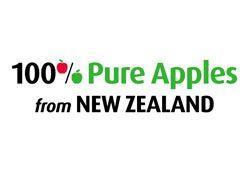
New Zealand’s apple export industry is taking its first few tentative steps since deregulation towards national branding this year with campaigns in India and Europe.
The industry will launch cooperative branding and promotional efforts in the two markets using the ‘100% Pure Apples from New Zealand’ branding developed by peak body Pipfruit New Zealand (PNZ).
Both programmes will be exporter-led, PNZ CEO Peter Beaven told Fruitnet.com. With the marketing materials developed and funded by the peak body, exporters will arrange promotions individually with buyers and retailers.
“The New Zealand industry has agreed to do some promotional work in India using the 100% Pure brand,” Mr Beaven said. “There will be posters and caps; various point of sale promotional materials. Exporters will be supplying those to Indian importers to help with supply there this year. It’s an encouraging initiative.”
The Indian market is showing great potential for New Zealand’s apple exporters, despite the current 50 per cent tariff. New Zealand sent 340,961 cartons (6,137 tonnes) to the market last year.
In Europe, the 100% Pure promotion will be limited at this stage to the Braeburn variety, building on early efforts at a cooperative marketing plan in Europe for the variety last year.
“We’re still working out the details `in Europe` with retailers,” Mr Beaven explained. “But we’ve made an appointment of a guy who’s coming on board to manage the campaign. It’s the first tentative step since deregulation, and it’s been approved by the exporters.”
Exporters accounting for about 90 per cent of the New Zealand Braeburn crop have agreed to support the European promotion, covering all the major industry players.
“Braeburn is the starting point because of the challenges it’s been having,” said Mr Beaven. “`New Zealand Braeburn` needs to differentiate itself.”
The two promotions are the first serious attempt at New Zealand-wide branding since the deregulation of the industry’s single-desk export structure in 1999. There has been a rising sentiment in the industry that the sector needs some form of marketing collaboration to overcome poor returns caused by challenging exchange rates and a staid European market.



